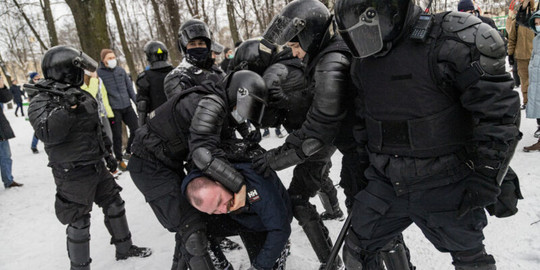On Sunday 31 January, tens of thousands of protesters took to streets across Russia to show support to the jailed opposition leader Aleksei Navalny. By late evening, more than 5,000 people had been detained in at least 85 cities across Russia, according to OVD Info, an independent NGO that monitors rallies.
Journalists were detained, obstructed or intimidated in at least 32 cities, including Moscow, St. Petersburg, Samara, Tyumen, Khabarovsk, Ulan-Ude…
According to JMWU-OVD Info monitoring, at least 120 journalists were detained, obstructed or beaten, while covering the protests. Law enforcement agents detained journalists from major Russian and international media (Kommersant, Radio Svoboda, Novaya Gazeta, RBK, Ekho Moskvy) and from small or regional media (Baza, Open Media, Kholod, MBKh Media , Sota.Vision, RusNews, Activatica, Karavan, the Shtab channel, Navalny LIVE, Rabochaya Democracy, Reporter-NN, Yakutia.Info, Udm-info…).
According to RUJ, the editor-in-chief of Batayskoe Vremya was condemned to 10 days of arrest in Rostov; a journalist for DonDay was detained and fined in Rostov; a photoreporter was arrested in Murmansk; several journalists, including the editor-in-chief of Babr.Media Andrei Temnov and the editor-in-chief of Yakutia.Info Denis Adamov, were detained in Irkutsk and Krasnoyarsk; Sergei Smirnov, editor-in-chief of Mediazona, was detained in Moscow; journalist Nikolai Svanidze was also detained in Moscow…
“Overall, we saw twice as many violations of media freedom this Sunday as the previous weekend. The repression is intensifying, even if the acts of violence remain limited,” commented the EFJ General Secretary Ricardo Gutiérrez. “The journalists covering these demonstrations were clearly identified. We call on the Russian authorities to protect these journalists rather than intimidate or prevent them from working.”
IFJ Secretary General, Anthony Bellanger, said: "We are shocked by this outrageous crackdown on the press. The Russian government must let our colleagues report safely on matters that are in the public interest. Journalism is not a crime. "

